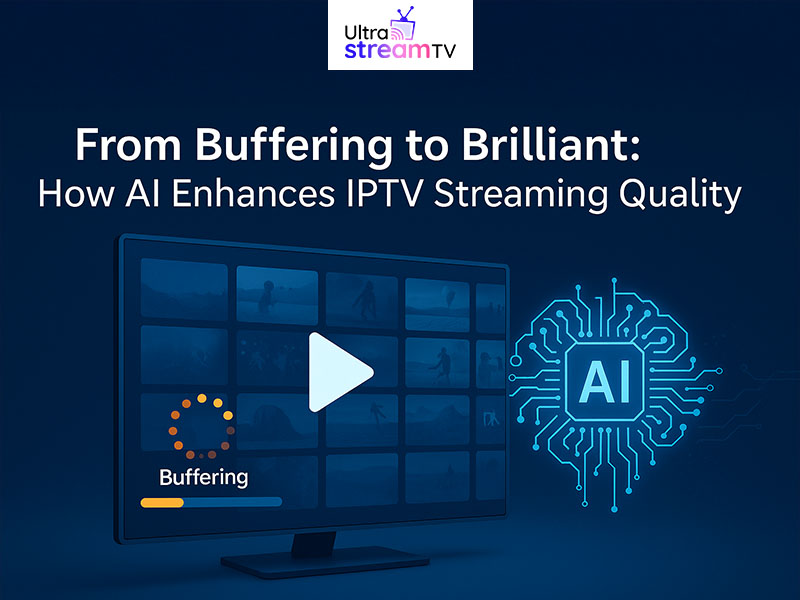
From Buffering to Brilliant: How AI Enhances IPTV Streaming Quality
In today’s world of binge-worthy content and on-demand entertainment, patience is no longer a virtue when it comes to streaming. Nobody wants to sit through endless buffering wheels or endure pixelated visuals. That’s where IPTV has stepped in as a game-changer. But even IPTV’s rise came with its share of growing pains.
Enter artificial intelligence (AI), the quiet hero now working behind the scenes to ensure your streaming experience is smooth, sharp, and incredibly responsive. Let’s dive into how AI is transforming IPTV from glitchy streams to a seamless viewing dream.
The Streaming Struggle Was Real
In the early days of IPTV, streaming was often a gamble. One moment, you were enjoying your favorite show; the next, you were staring at a frozen frame or blurry image. These issues typically stemmed from variable internet speeds, overloaded servers, and rigid streaming protocols that couldn’t keep up with real-world demands.
But with AI in the mix, streaming services no longer play catch-up. They predict, adjust, and optimize in real-time—solving problems before you even notice them.
Smarter Bitrate Streaming with AI
Traditional adaptive bitrate streaming was more of a reactionary fix—it adjusted video quality only after things started going wrong. Today, AI has flipped the script.
By continuously monitoring network strength, device performance, and even screen size, AI systems can deliver the right video quality at the right time. These systems don’t just respond—they learn. Over time, they tailor streaming settings for each user, offering personalized performance that prevents issues before they begin.
AI-Powered Caching: Predict Before You Press Play
Ever wonder how your favorite show starts instantly, even during peak hours? That’s AI in action again, this time working behind the scenes with predictive caching.
By analyzing viewer behavior, locations, and trending content, AI anticipates what you’re likely to watch next. It then stores that content closer to you—thanks to edge computing—minimizing buffering and boosting load speeds. This smart distribution ensures content is available when and where it’s needed, with zero wait time.
Boosting Video Quality Without More Bandwidth
Not all content is delivered in pristine 4K—but you might never notice, thanks to deep learning. AI can now enhance video quality in real time, even on lower-resolution streams.
Using neural networks, these systems clean up compression artifacts, improve color accuracy, and upscale resolution on the fly. Whether you’re watching an old show or streaming on a slow connection, AI makes it look significantly better—without using more data.
Intelligent Error Correction = Uninterrupted Entertainment
What happens when data packets go missing or the internet hiccups mid-episode? Old systems might freeze or skip. AI, however, has a better plan.
Modern AI streaming platforms use predictive modeling and contextual data to reconstruct lost or corrupted video frames. This intelligent recovery ensures that even when something goes wrong behind the scenes, your stream stays smooth and intact.
Tailored to You: Personalized AI Optimization
AI in IPTV isn’t just about quality—it’s about you. Machine learning models now build detailed viewer profiles based on your habits, devices, network, and preferences.
This data powers a dual experience: not only does it adjust streaming quality in real time, but it also fuels smarter content recommendations. Whether you’re watching on a smartphone during a commute or on a 4K TV at home, the system optimizes accordingly.
What’s Next: 5G, Quantum, and Beyond
The future of IPTV is bright—and fast. As 5G networks become mainstream and quantum computing makes its way into commercial use, AI’s role in streaming will only expand.
Expect near-zero latency, real-time 8K streaming, and even more intelligent compression methods. With specialized AI chips designed specifically for streaming tasks, performance will soar while energy usage stays low.
Getting AI IPTV Right: What Providers Need to Know
Adopting AI in IPTV isn’t plug-and-play. Providers must invest in data infrastructure, scalable cloud environments, and constant performance monitoring to truly reap the benefits.
Successful implementation often means starting small—perhaps with adaptive bitrate features—and scaling up to more advanced tools like real-time video enhancement or AI-driven caching systems. It’s not just about adopting AI; it’s about adapting your operations to thrive in an AI-first world.
Final Thoughts: Streaming Has Grown Up
The jump from clunky, buffering-riddled IPTV to flawless, intelligent streaming is one of the most exciting tech evolutions we’ve seen. Artificial intelligence has quietly but powerfully reshaped how we experience entertainment.
Today, we don’t just stream content—we experience it. It’s responsive, it’s personal, and it’s only getting better. As AI continues to evolve, the line between traditional TV and futuristic entertainment ecosystems will blur, ushering in a new era where every stream feels tailor-made, perfectly timed, and effortlessly brilliant.
Frequently Asked Questions
1. How is AI improving IPTV streaming quality?
AI enhances streaming by predicting network conditions, adjusting video quality in real time, and reducing buffering for a smoother experience.
2. What is AI-powered predictive caching in IPTV?
It’s a technique where AI predicts what content users will likely watch and pre-loads it closer to them using edge computing, ensuring faster load times.
3. Can AI really improve video quality without using more data?
Yes, deep learning algorithms can upscale resolution, clean up visual artifacts, and improve color—delivering better visuals without increasing bandwidth usage.
4. How does AI help during internet disruptions?
AI uses intelligent error correction to reconstruct missing or corrupted video frames, keeping the stream uninterrupted even during brief network issues.
5. What’s the future of IPTV with AI?
With the rise of 5G and quantum computing, IPTV will become even faster, more intelligent, and capable of delivering ultra-HD, personalized experiences in real time.
